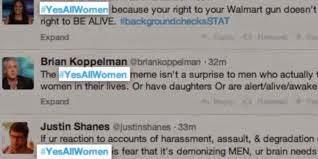
Rebecca Solnit sees 2014 as a loud, discordant, transformative year for feminist insurrection against male violence. And as she notes, the internet has played a key role in what has happened: it has given women a new voice, and permitted them to organize against male violence in an unprecedented way.
Solnit writes,
A young woman coined the hashtag #YesAllWomen, was hounded into silence and invisibility for a while, but what she started was unstoppable. Women began telling their stories of harassment, threats, violence and fear, reinforced by each others’ voices. Change begins at the margins and moves to the centre; social media has made the edges more powerful, and the transit from margin to center more swift – or maybe even blurred the distinction, as mainstream media sometimes scurries to catch up to a vibrant public debate in social and alternative media.
Change begins at the margins and moves to the centre; social media has made the edges more powerful, and the transit from margin to center more swift: to my ears, these observations sound intuitively correct. The mainstream media have long been accustomed to the power-brokering position when questions about who will or won't be heard are at stake.
Now, as Solnit says, they're in a position of having to catch up to many of the voices they previously read out of the conversation, due to the ability of online technology to allow those on the margins to be heard — and thereby to change the center. The mainstream media are not pleased with this development. But, short of sheer repression of online conversations, it's the wave of the future.
The graphic is a screen shot from an AOL video entitled "What's Up with the #YesAllWomen and #NotAllMen Hashtags?"

